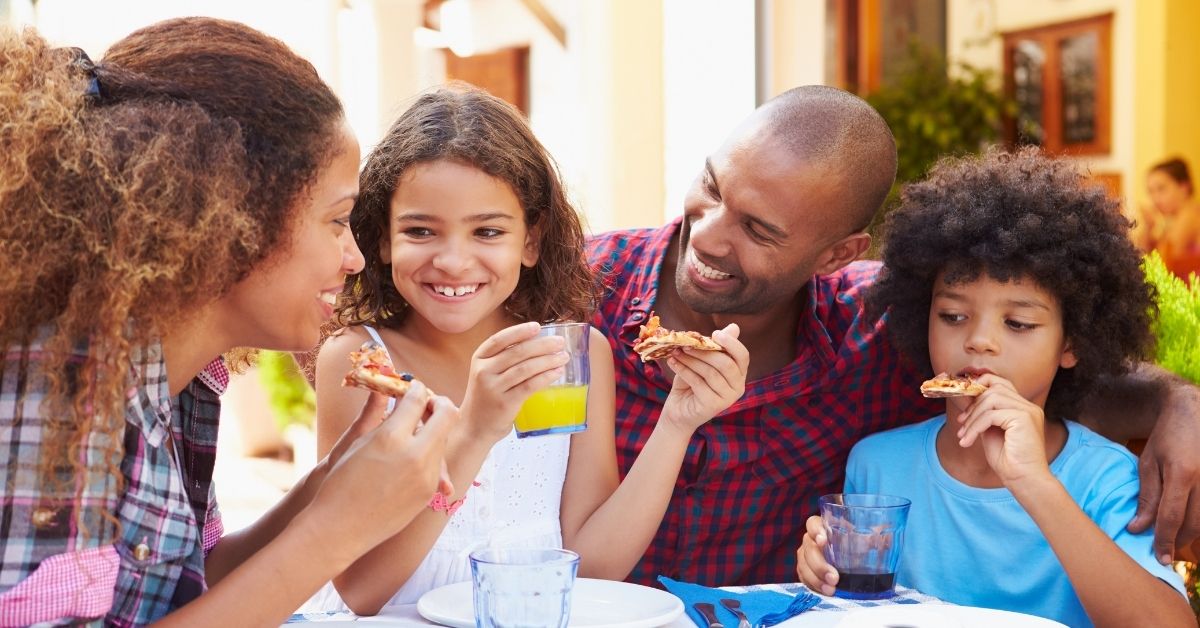In this article:
- Benefits of Cooking and Eating Together as a Family
- Your Kids Will Eat More Healthy Foods
- Built-in Time Together
- Creating and Passing on Family Tradition and Recipes
- A Skill They Will Use for the Rest of Their Life
- Less Likely to Use and Abuse Drugs
- Maintain Open Lines of Communication
- Foster Positive and Supportive Relationships with Children
- Maintain Family Rituals, Such as Eating Dinner Together Regularly
- After the Benefits, Next Steps
Kids who won’t eat their veggies. Not spending enough time with the kids at home. Eating out too much these days. These and other challenges, maximizing time with your family, and saving money can all be addressed by slowly introducing a new tradition to your family: cooking with your kids.
In this article:
- Benefits of Cooking and Eating Together as a Family
- Your Kids Will Eat More Healthy Foods
- Built-in Time Together
- Creating and Passing on Family Tradition and Recipes
- A Skill They Will Use for the Rest of Their Life
- Less Likely to Use and Abuse Drugs
- Maintain Open Lines of Communication
- Foster Positive and Supportive Relationships with Children
- Maintain Family Rituals, Such as Eating Dinner Together Regularly
- After the Benefits, Next Steps
Or maybe you already cook with your kids? My wife and I often take turns preparing meals with our daughter. And after writing this blog, I am more convinced than ever how important it is to cook and eat together as a family.
Read to know why eating as a family is important? and what are the benefits of cooking together as a family?
Benefits of Cooking and Eating Together as a Family
Your Kids Will Eat More Healthy Foods
We all want our kids to eat healthy foods. Studies consistently show kids who learn how to eat healthily as kids, continue to eat healthily as adults. Here are a few points to think about when we cook with our kids:
- Kids learn more about nutrition.
- Kids learn about fruit and vegetable options instead of junk food.
- Kids will eat fewer meals outside the home.
- Parents are also more likely to healthily eat while cooking with the kids.
- Some picky kid eaters are more likely to try something new when they make it.
One of my favorite tips when cooking with our daughter is to snack on raw, sliced capsicum (bell pepper), carrot, or other fruit or vegetable I want to introduce her to. Often, before I know it, she’s consumed most of the vegetables she needs before starting dinner.
Built-in Time Together
Another benefit of cooking together as a family is hanging out together. Sometimes our daughter just sits on her stool, and we talk about our days while I cook. Sometimes, all I can get out of her is to set the table. Which is helpful! The most crucial point is that we are in the habit of hanging out together in the kitchen. We are social. She watches me cook. I complete a vital task on my list, and we’ve spent quality time together.
Creating and Passing on Family Tradition and Recipes
This benefit is one of my favorites. When I grew up, we didn’t hang out in the kitchen. My dad often worked late, and my mom, a sixth grade Language Arts teacher, needed to get dinner together as quickly as possible to manage us four kids.
I always loved going to a friend’s house whose family hung out together in the kitchen. My wife and I wanted to create this dynamic in our home. Which has become for us a family tradition. One that I hope my daughter extends into her own adult life.
Many of us also have family recipes to pass on. Don’t be the link that breaks the chain! Cooking together as a family is a time to share stories about those recipes. Who first created this dish? Who passed it on to whom?
A Skill They Will Use for the Rest of Their Life
Learning how to cook and establishing healthy eating patterns is one of the most vital lessons we can provide our kids. It’s not just about cooking either. Include your kid when planning meals and shopping. There are a variety of skills our kids will need when they leave home, including knowing how to shop and budget their money. Before we know it, our kids leave for school or a job, and many will start their own families. Knowing how to plan a budget, shop, and cook for themselves are vital skills they will need.
Less Likely to Use and Abuse Drugs
This benefit surprised me. When I first read that making meals and eating together as a family could reduce the chance of drug abuse, I thought the authors must be exaggerating.
Columbia University released a study Family Matters: Abuse and the American Family in 2005 that provides 10 steps to help parents prevent substance abuse in their families. I welcome you to check it out for yourself.
Three of the 10 steps in Chapter 4, “What Parents Can Do To Prevent Children’s Substance Use and Abuse,” tie directly to the benefits of regularly making meals together.
Maintain Open Lines of Communication
Again, start early. Our daughter naturally hangs out with us in the kitchen at least every other day. It’s part of our family tradition and dynamic. It’s one I also hope to maintain. On any given day, while making a meal together, we may talk about the boy who pushed her at school, the star she received from her Hindi teacher, the new Taylor Swift song she heard in the car or a hundred questions on just about any topic.
There are times she refuses to help. And I’m sure there will be times during her teenage years where being in the kitchen with me is the last place she will want to be. I know the kitchen will always be a refuge, part of our family history and tradition, that we will always be able to come back to. Is it strange that I look forward to hanging out in the kitchen when she’s an adult coming home to visit? Working on a meal together is the perfect activity to do with your hands while sharing stories.
Foster Positive and Supportive Relationships with Children
Working on a meal together is a neutral activity that doesn’t remind us of previous disagreements or power struggles. If we are upset with our child, or our child is angry with us, praising them for mixing the flour and water together for pancakes, or thanking them for prepping the vegetables can help us move forward. Praising, thanking, complimenting, and showing affection are all expressions of our love that we can express while making tacos. The study shows that having a positive and close relationship with either parent reduces the chances of substance abuse significantly.
Maintain Family Rituals, Such as Eating Dinner Together Regularly
Just in case you felt my first two steps were a stretch, the third gets right to the point. “Teens who have dinner with their families five or more nights in a typical week are 45% likelier to report that they have never tried alcohol compared to teens compared to teens who have dinner with their families two nights a week or less (28).” The study notes that not only are teens at home with you, instead of out with their friends, but the dinner tables becomes a ritual, a routine, that kids and teens can depend on. Families that don’t have this kind of support and routine, unfortunately, are more likely to cope with substance abuse.
After the Benefits, Next Steps
When I learn about the benefits on a topic I am interested in, I usually come away with a list of next steps. Most of the time, I’m more informed and motivated with ideas on how to better myself and the people around me. For example, check out two of my previous blogs– providing kids choices and kids practicing mindfulness. For example, my wife and I have strived to provide our daughter with choices when choosing activities and taught her a few mindfulness exercises before I wrote these blogs. But I also read several articles on each topic to help me ground my own experiences.
When I finished both of these blogs, I renewed my own interest and motivation and came up with a list of next steps. To help you get started, check our next blog 10 Tips to Start Cooking Meals with the Kids. Studies show that it only takes one parent or family member to eat with our kids to realize some of these benefits. When it comes to cooking with your kids, start slow. Choose a meal once a week on the weekend. Once both of you get the hang of it, you won’t think twice about the extra mess and patience. And soon enough they’ll just show up in the kitchen, to hang out and talk.
Share any tips, experiences, or advice in the comment section below you’ve had cooking and sharing meals together with your kids.









